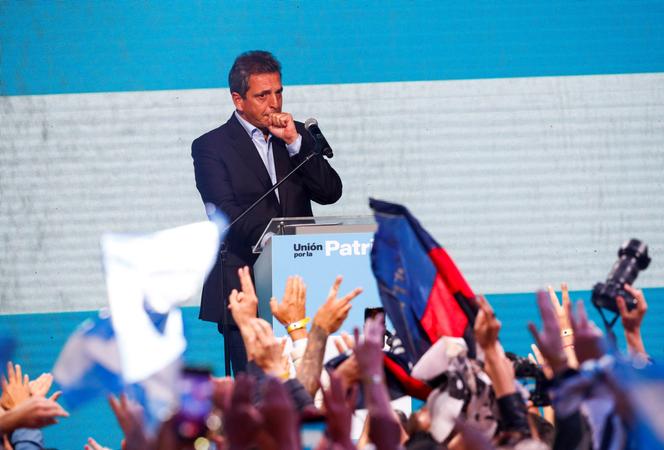


Once thought to be on its last legs, Peronism is not only alive and well, but its candidate, Sergio Massa, unexpectedly came out on top in the first round of Argentina's presidential election on Sunday, October 22, (36.7%), leaving the far-right populist Javier Milei in second place. Milei nonetheless won 30% of the vote – confirming the score he had achieved in the August 13 primary elections – and will therefore compete against Massa, the current minister of economy, in the second round on November 19. An unprecedented duel between an outsider and a political force with a seventy-year history.
"This result shows that Argentina hasn't turned far-right! We've learned from the mistakes of Brazil, where Jair Bolsonaro worsened poverty," exclaimed 28-year-old Victoria Gonzalez with relief outside Massa's campaign HQ, noting the surprise result for the Peronist candidate. "We didn't let the results of the primaries [in which the Peronist came second] get us down. It's a victory for grassroots activism on social networks, but also on the ground, by talking to our neighbors, colleagues, and friends," said Analia Branca, a 49-year-old social worker, with enthusiasm.
Peronists also obtained another significant victory with the landslide re-election of Axel Kicillof, the current governor of Buenos Aires province – the country's most populous – in the provincial elections that were held at the same time.
Milei, who had predicted a first-round victory but ended up stagnating compared to his primary result, sought to hold his head high. "Today is historic because two-thirds of Argentines voted for change," he declared in his speech, which was briefer and much more subdued than his previous statements.
"It's a strange feeling," admitted Mauro Mendoza, a 60-year-old barber, outside Milei's campaign HQ on Sunday evening. "Frankly, this result doesn't reflect the enthusiasm for Milei that we see on a daily basis. I thought he was going to come first." The disappointed activist continued: "We absolutely have to bring stability to the economy, stop issuing money," in reference to the candidate's proposal to abolish the Central Bank to put an end to the scourge of Argentina, inflation – 138% over one year, at the origin of the country's 40% poverty rate. Milei's radical proposals also included replacing the national currency with the dollar, drastic tax and public spending cuts, and the freedom to bear arms.
"Javier Milei was scary. It was a proposal for change, but by flame-thrower," remarked Pablo Seman, a sociologist at the National University of General San Martín (UNSAM). La Libertad Avanza ("Liberty advances"), his ultraliberal coalition, is barely two years old. It was created for the 2021 legislative by-elections, the year in which Milei was elected to parliament. Since he burst onto the political scene, the economist (who turned 53 on Sunday) has constantly criticized the political "caste", rejecting the two traditional political forces – Peronist and anti-Peronist – which have governed the country for the last twenty years. Faced with Sunday's results – which once again contradicted the polls – and in view of possible alliances, he this time sent clear signals of openness to the right-wing candidate, who came in third, well behind Massa and Milei.
You have 53.61% of this article left to read. The rest is for subscribers only.
